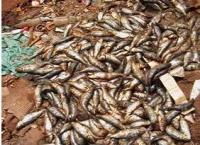Ms Jojo Huang of Golden Lead told Foroyaa on Saturday that it is incorrect to say that their company dumps fish in the sea or anywhere, whether in Gunjur or elsewhere. She emphasized that their company is in no way responsible for the spoilt fish on the beaches and roadsides of Gunjur. Ms Jojo Huang, the daughter of the proprietor, made these statements when she visited Foroyaa’s offices to clarify the position of their company. She was accompanied by Mr Bakary Darboe of the same company.
She explained that the company, which employs 60 workers, don’t fish, they only buy fish that are brought to the factory for sale; and that the fish they buy are fresh and limited in quantity. The quantity she said is limited to what the factory can produce which are 3000 baskets per day. Any further supply beyond this will not be purchased and the supplier will have to return with their truck load of fish, she added. She added that they even have a sign board indicating that they confine themselves to the guidelines provided by the government.
She said all they do is to prepare fish meal which consists of the following process: cook the fish, extract oil and squeeze the fish to form a cake. The waste product is waste water, she added. The products are fish meal and fish oil, so therefore it is wrong to say they dump rotten fish, she explained.
In her view the multitude of fish lying on the beach are from fishing trawlers that make a big catch, select what they want and dump the rest (mainly bonga) which are then wash onto the shores. She asserted that the same could be found in Tanji.
Regarding the use of protective gears, while emphasizing that they treat all employees alike, she explained that while they are all supplied with protective gears, the employees are not keen in putting them on, whether Chinese or Gambian; but as from now on they will ensure compliance.
According to the water quality analysis done by the Water Quality Monitoring Laboratory in Abuko which was shown to Foroyaa by Ms Jojo Huang samples from the septic waste pipe and manhole at the septic are very concentrated and further treatment through dilution need to be done prior to disposal to avert future environmental hazard to the flora and fauna. Samples from engine room cooling outlet and cooling waste discharge are in conformity with the WHO standards for irrigation water purposes, she said. Sample from the borehole water is suitable for consumption as well as domestic use, according to her. Sample of sea water is suitable for recreational and fishing activities, she explained.
Ms Jojo Huang said that the reporter failed to approach them to get their side of the story but this is what the reporter said: “When I went to your Company on Wednesday 17th May, 2017, I was led by a security guard to a Chinese interpreter who directed me to the security shed where I was met by three other Chinese. When I introduced myself and requested for an interview I was told that I had to wait till another day. The security guard was then asked to lead me out of the premises.”


More
Gunjur fisher folks speak on the dumping of fish
"Golden Leaf Factory is an Environmental Hazard" – Gunjur Native Complains to Foroyaa
Chinese Owned Fish Factory Denies Polluting Gambian Sea
JollofNews, 22.05.2017
WRITTEN BY Alieu Cham
(JollofNews) – A Gambian based Chinese owned fishing factory at the centre of severe online criticisms has rejected allegations that it is dumping waste into the country’s sea and damaging the environment.
Golden Leaf Factory in the coastal fishing village of Gunjur, Kombo South, is accused of releasing intense bad odour which is making people sick as well as destroying the country’s fish reserves and polluting the waters.
Activists said the factory is threatening the lives and livelihoods of the people of Gunjur and the Gambia.
But speaking to journalists during a field inspection of the factory, Basiru Ndong, an employee of the factory, described the allegations as untrue.
“We do not dump infantile fish at the sea, nor do we destroy the marine resources of the country,” he said.
Mr Ndong pointed out that the factory is engaged in fish meal production which has a popular local and international market.
“We have a noticeboard where we stipulated clearly that we buy only fresh fish and infantile ones,” he added.
“There are some occasions where people bring bad fish and dump it along the seaside and people end up blaming us.”
Mr Ndong accused those calling for the closure of the factory of having a hidden agenda.
He argued that the establishment of the factory has brought immense benefits to not only people in Gunjur but the surrounding villages.